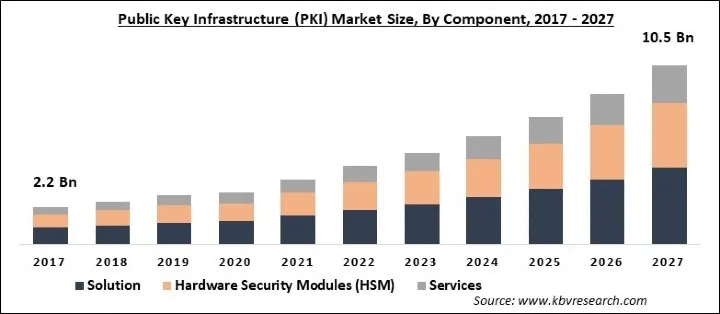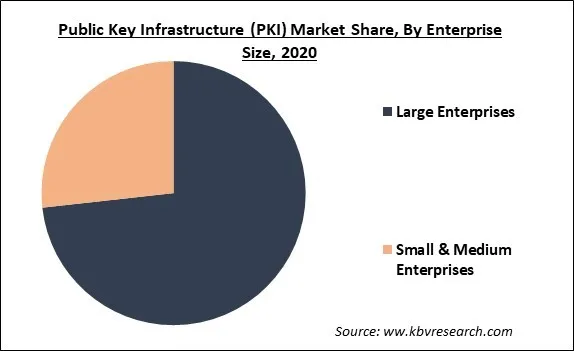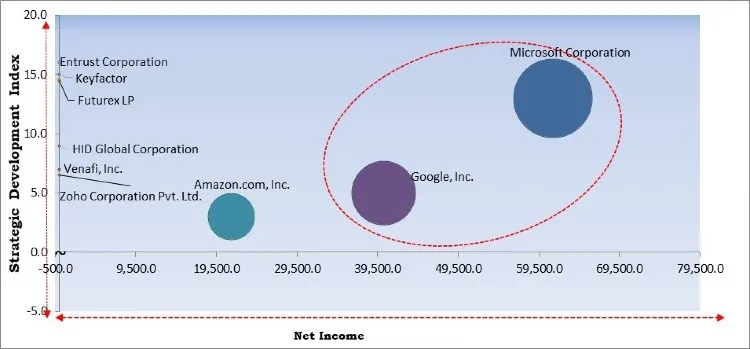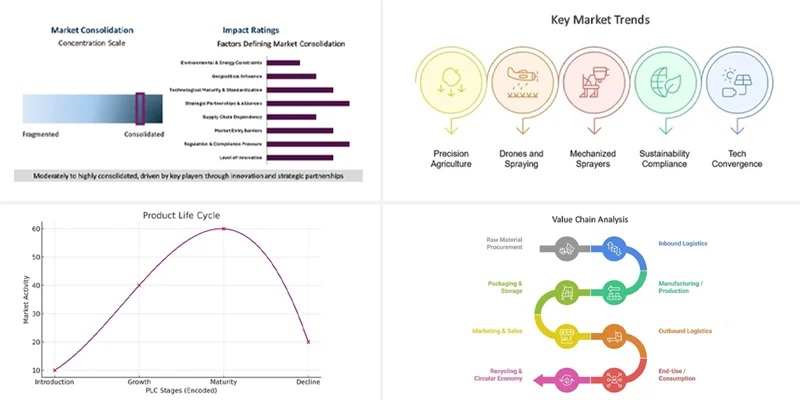The Global Public Key Infrastructure (PKI) Market size is expected to reach $10.5 billion by 2027, rising at a market growth of 18.4% CAGR during the forecast period. Public key infrastructure refers to a security technology structure of encryption and cybersecurity, which assists in securing the communication between the client and the server. This technology operates by utilizing two distinct cryptographic keys viz. a private key and a public key. A public key needs to be accompanied by a private key, which is owned by a trusted party, in order to communicate on a website.
In addition, the technology safeguards the user’s data from any kind of breach or theft. There are many companies that are increasingly adopting the Secure Sockets Layer (SSL) certificate, which utilizes public key infrastructure for authentication and encryption. These trusted certificates are issued by certificate authorities and could be utilized to validate entities. The trust hierarchy while issuing digital certificates involves numerous entities like intermediate certificate authorities, root certificate authorities, and issuing certificate authorities.
The process of permitting data sharing or transaction between the receiver and sender by offering protection with public & private keys, which are sanctioned by central authorities by using digital certificates, is known as Public Key Infrastructure (PKI). The rising adoption of PKI services and solutions and the increasing concerns related to the loss of important data are among the key aspects bolstering the growth of the PKI market. In addition, the growing cases of malware and file-based attacks, the rising trust in online sellers & customers, and strict mandatory compliances and regulations are anticipated to fuel the growth of the PKI market. The adoption of various advanced technologies like IoT and cloud trends is increasing, which is creating lucrative growth opportunities for the key market players.

The outbreak of the COVID-19 pandemic has impacted various segments of society. During this crisis, the internet ecosystem has played a crucial role across the world, which is ongoing in the world. Several sectors including BFSI, manufacturing, healthcare & life sciences, automotive, transport & logistics, retail, among others, are increasingly utilizing the internet to deliver their crucial services to consumers. There are numerous companies that have witnessed declining demand for a PKI system.
During the COVID-19 pandemic, many governments & regulatory authorities have directed the public and private companies to carry out new practices of teleworking and fulfill the social distancing norm. At present, digital modes of operating business and utilization of emails with home servers have become the latest business continuity plan (BCP) for several companies. There is a significant inclination of the customers towards the usage of PKI due to the extensive usage of mobile devices and internet penetration around the world. Such kinds of trends and distributed IT surroundings have made companies more vulnerable to data breaches and cyber-attacks, which further accelerate the demand for PKI solutions.
There are several companies that are increasingly adopting various technological developments like virtualization, enterprise mobility, and cloud storage to increase business productivity. These advancements have enabled companies to function effectively and in real-time so that business information can be conveniently accessed on mobile gadgets from the cloud and virtual storage. Though, this access to important business data on mobile devices would increase the data loss and theft risk.
There are many companies that are majorly focusing on the effects of the latest applications like IoT on PKI. The introduction of IoT has offered several opportunities for every industry vertical. Companies are getting more concerned about the instant release of new products in the market, regardless of the proper deployment of the security controls. Due to this, the security concerns and cyber risks on the security of IoT devices are increasing.
There are numerous companies that establish private certification authorities or utilize self-signed certificates to validate and protect internal servers, applications, and IP addresses, which do not need a public trust, however, require the security offered by SSL encryption. These self-signed certificates can provide encryption just like a certificate signed by a trusted authority. Though, the certificate could not be canceled like a trusted certificate, and it would result in an attack on visitors’ connections.

Based on Component, the market is segmented into Solution, Hardware Security Modules (HSM), and Services. The Solution market dominated the Global Public Key Infrastructure (PKI) Market by Component 2020. There are many key vendors in the market that are aiming on providing dedicated services to assist companies with the simplified operations of the business procedures. Professional services include deployment & integration and training & consulting. In addition, managed services involve maintenance, support, and infrastructure management. The services segment for the PKI market is projected to witness high demand in the forecast period in order to support business goals. The growing requirement for designing, planning, and consulting PKI solutions would propel the demand for professional services in the market.
Based on Deployment Type, the market is segmented into On-premise and Cloud. The On-premise market dominated the Global Public Key Infrastructure (PKI) Market by Deployment Type 2020. The Cloud market is expected to witness a CAGR of 22.7% during (2021 - 2027).
Based on Enterprise Size, the market is segmented into Large Enterprises and Small & Medium Enterprises. The Large Enterprises market dominated the Global Public Key Infrastructure (PKI) Market by Enterprise Size 2020, growing at a CAGR of 17.6 % during the forecast period. The Small & Medium Enterprises market is estimated to grow at the highest CAGR during the forecast period.
Based on End User, the market is segmented into BFSI, Retail, Government & Defense, Healthcare, Telecom & IT, Manufacturing, and Others. PKI technology could be easily combined with the current banking system and assist these companies in streamlining complicated business procedures by providing higher security and enhanced turnaround time for onboarding a user. Further, PKI solutions provide the twin advantages of authentication along with encryption, thus, safeguarding the possibly sensitive documents of the companies from unauthorized access & identity thefts.
| Report Attribute | Details |
|---|---|
| Market size value in 2020 | USD 3.1 Billion |
| Market size forecast in 2027 | USD 10.5 Billion |
| Base Year | 2020 |
| Historical Period | 2017 to 2019 |
| Forecast Period | 2021 to 2027 |
| Revenue Growth Rate | CAGR of 18.4% from 2021 to 2027 |
| Number of Pages | 290 |
| Number of Tables | 464 |
| Report coverage | Market Trends, Revenue Estimation and Forecast, Segmentation Analysis, Regional and Country Breakdown, Competitive Landscape, Companies Strategic Developments, Company Profiling |
| Segments covered | Component, Deployment Type, Enterprise Size, End User, Region |
| Country scope | US, Canada, Mexico, Germany, UK, France, Russia, Spain, Italy, China, Japan, India, South Korea, Singapore, Malaysia, Brazil, Argentina, UAE, Saudi Arabia, South Africa, Nigeria |
| Growth Drivers |
|
| Restraints |
|
Based on Regions, the market is segmented into North America, Europe, Asia Pacific, and Latin America, Middle East & Africa. North America is anticipated to emerge as the leading region in the public key infrastructure market by obtaining the maximum share. This growth is attributed to the factors like prompt adoption of PKI solutions & services and the presence of many key market vendors that deliver advanced PKI solutions.

Free Valuable Insights: Global Public Key Infrastructure (PKI) Market size to reach USD 10.5 Billion by 2027
The major strategies followed by the market participants are Product Launches. Based on the Analysis presented in the Cardinal matrix; Google, Inc., and Microsoft Corporation are the forerunners in the Public Key Infrastructure (PKI) Market. Companies such as Amazon.com, Inc., Zoho Corporation Pvt. Ltd., Entrust Corporation, Futurex LP, HID Global Corporation are some of the key innovators in the market.
The market research report covers the analysis of key stake holders of the market. Key companies profiled in the report include Google, Inc., Amazon.com, Inc., Microsoft Corporation, Zoho Corporation Pvt. Ltd., Entrust Corporation (Thoma Bravo, LP), Futurex LP, HID Global Corporation, Venafi, Inc. (Thoma Bravo), Keyfactor (Certified Only, Inc.), and Nexus Group.
By Component
By Deployment Type
By Enterprise Size
By End User
By Geography


The global public key infrastructure (PKI) market market size is expected to reach $10.5 billion by 2027.
Growing adoption of IoT trend in numerous industrial verticals are driving the market in coming years, however, usage of self-signed certificates have limited the growth of the market.
Google, Inc., Amazon.com, Inc., Microsoft Corporation, Zoho Corporation Pvt. Ltd., Entrust Corporation (Thoma Bravo, LP), Futurex LP, HID Global Corporation, Venafi, Inc. (Thoma Bravo), Keyfactor (Certified Only, Inc.), and Nexus Group.
The BFSI industry is anticipated to acquire the maximum market share in the PKI market. In addition, this industrial vertical is the most targeted vertical since it manages a huge amount of sensitive and private financial data.
The Solution market dominated the Global Public Key Infrastructure (PKI) Market by Component 2020, The service segment is estimated to exhibit the prominent CAGR over the forecast period.
The North America market dominated the Global Public Key Infrastructure (PKI) Market by Region 2020, and would continue to be a dominant market till 2027.
Our team of dedicated experts can provide you with attractive expansion opportunities for your business.

